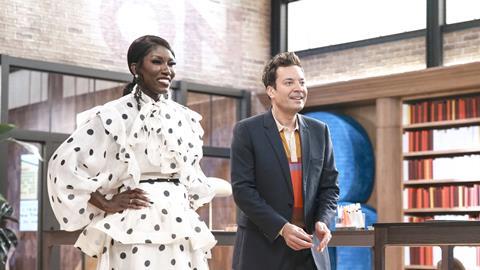‘It’s tapping into that notion that a great idea can come from anywhere and anyone’
Distributor NBCUniversal Formats, a division of Universal Studio Group
Producers B17 Entertainment (Sony Pictures Television); Universal Television Alternative Studio (Universal Studio Group), in association with Electric Hot Dog
Length Format (variable length)
Broadcaster NBC (US)
Just how it will be marketed to global buyers remains to be seen, but the premise of competition format On Brand, dreamed up by chatshow giant Jimmy Fallon, is clear: design the biggest, boldest advertising campaign for household products.
“The idea for the show came from Jimmy, who loves all things related to brands, campaigns and marketing,” says NBCUniversal senior vice president for format sales and production Hannah Mabruk. “His aim was to create something that is an opportunity for audiences to see how the world of marketing works.
“These days, everyone thinks of themselves as a content creator – so it’s really tapping into the notion that a great idea can come from anywhere and anyone.”
In each episode, a well-known brand takes centre stage, inviting contestants to pitch their ideas for real-life campaigns – Mabruk gives the example of Dunkin’ Donuts, known for its coffee and doughnuts, but which wants to promote its less well-recognised breakfast menu. The best two pitches, chosen by the company, are then developed by all the competitors, working together.
In some ways, Mabruk says, the format will be familiar to anyone who’s watched The Apprentice. But what makes the show stand out is that while each episode will have a star competitor, no one will be asked to leave. “The idea is that they are all working together to be creative, so in between the competition moments, you get the sort of ensemble comedy you might get in a scripted show such as The Office,” she says.
Episodes are filmed months ahead and the campaigns created on the show are timed to launch the day after the episode drops, providing an immersive experience for audiences. Mabruk hopes this will help endear the format to broadcasters with linear slots to fill, as well as streamers.
In terms of demographics, she says, it might help to bring in those elusive younger viewers: “Some cast members are influencers and it’s going to have a strong digital component, so I’m hoping that it’s going to be younger-skewing than traditional primetime entertainment shows.”
The companies that feature in the show are also co-funders of the project. “We all know there are challenges around funding of entertainment, and we know that brands are not just satisfied with the 30-second ad,” Mabruk says. “What better than to have a primetime entertainment show where essentially the brand is the star?”
In different territories, she acknowledges, there might be a need to alter the funding model depending on local regulations – for example, by having the brands commit to a specific level of spend with the broadcaster rather than funding the show directly. But she’s confident the format will sell across multiple localities and says it is already generating buzz.
“At Mip Africa in South Africa, people were seeking me out to ask about this show,” she says. “When you look at the US version, you might immediately think of it going into Western Europe, Australia and the UK, but actually, the Asian and African markets have had brands involved with funding programming for a lot longer than we have. It feels like there aren’t any limits on where it could go.”
Unveiled: Mipcom 2025 Hot Picks - Unscripted

A US competition show and a German dating format join factual deep dives into the Chernobyl disaster and a global crime ring























No comments yet